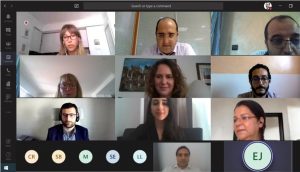Rabat, Morocco; June 24, 2020 – The Global Green Growth Institute (GGGI) in close collaboration with the Department of Environment within the Ministry of Energy, Mining and Environment and the Ministry of Interior organized a virtual launch event for the GCF Readiness project “Enhancing Access to Climate Finance in Morocco’s Regions”. The objective of the meeting was to present the project’s objectives and goals, as well as to validate the stages of implementation, which will take place over a period of 18 months, from June 2020 to December 2021.
The project aims to support local and regional governments in accessing climate finance and in structuring bankable projects, and is based on 2 components conducted in parallel:
- Design a multi-sector NFV to help territories (regions, provinces, and municipalities) access climate finance to support the implementation of bankable programs and projects
- Design a Regional Climate Finance Pipeline Development Capacity Building Program for the Climate Change Competency Center (4C) using a train-the-trainer approach so it can accompany the national and regional stakeholders in prioritizing and preparing a pipeline of bankable, sustainable and inclusive climate finance projects in support of the GCF Country Program and financeable via the NFV.
The two components will be conducted in parallel in close collaboration with the senior investment specialist in charge of designing the NFV, M. Ludwig Liagre, and the E. Co Ltd. group for the design of the Regional Climate Finance Pipeline Development Capacity Building Program.
In his opening remarks, M. Rachid Tahiri, Head of Division within the Climate Change, Biodiversity and Green Economy Direction within the Department of Environment, underlined the good progress made in Morocco on the implementation of climate action and the promotion of the green economy, through various strategic and institutional projects, such as the NDC currently under review to enhance the country’s ambition, and ranked second after Sweden in terms of climate performance, and the National Climate Plan for a low-carbon and climate resilient development among others. Nevertheless, a long-term vision concerning the implementation of climate finance needs to be strengthened.
Mr. Zoubir Idrissi, the project focal point at the Ministry of Interior emphasized the need to have a framework for the implementation of the national climate policy at the regional level, particularly in terms of capacity building for territories, which to date do not have the technical capacity to develop eligible proposals to international donors. In this sense, the technical capacity building program for the territories is crucial to ensure a positive contribution to the achievement of Morocco’s NDCs objectives.
Ms. Rajae Chafil, Director of the 4C Morocco, reinforced the importance of taking action to build capacity in climate finance, which is a major obstacle for territorial actors who do not master the bankability aspects of projects. Ms. Chafil underlined the relevance of this project, which is targeting the territories, and therefore will accompany the actions currently being developed by the country.
Ms. Nicole Perkins, GGGI’s Country Representative for Morocco, emphasized GGGI’s support for the implementation of this project in partnership with the technical experts, with the aim to accompany Morocco’s efforts to develop inclusive green territories and contribute to the Nationally Determined Contribution (NDC) 2030 targets and the closing of the green investment gap in conditional investments.

Virtual launch event with the key representatives from the Department of Environment, Ministry of Interior, 4C Morocco, E Co. Ltd group, the senior investment specialist and GGGI Morocco team
The establishment of an NFV will enable Morocco to mobilize additional climate financing at the international level, and also to move from a project-based funding approach to a national integrated climate change investment strategy, with a pipeline of priority climate finance projects and associated resources.
The design of a Climate Finance Pipeline Development Capacity Building Program dedicated to the development of a regional project pipelines will be based on a training of trainer’s approach to the 4C, so it can deploy the program to all relevant regional actors and ensure the long-term sustainability of this program. Ultimately, this capacity building program will increase the national ability to support subnational actors to prioritize and prepare bankable, sustainable, and inclusive finance projects which will create a solid and continual pipeline for the NFV.
During this process, one operational Regional Project Execution Agency (AREP) will be identified and will be assisted in the development and prioritization of a climate finance pipeline. It will 1) allow the AREP to build capacity to structure investment projects; 2) enable at least one project to be structured and concept note submitted to GCF; 3) develop ten concept notes that can be submitted to climate financiers, and 4) inform the development of tools and materials for the capacity building program based on this practical and concrete experience.
The event gathered the key institutional partners involved in the project, with representatives from the Ministry of Interior, the Department of Environment within the Ministry of Energy, Mines and Environment as the GCF Focal Point, the 4C, the technical experts that will be in charge of the NFV design, the climate finance pipeline project and the capacity building program design, as well as GGGI Morocco team.
All participants expressed their strong commitment to working closely together to ensure the successful implementation of this project.
The next step will be to set up and organize the first meeting of the project Steering Committee, which will provide the strategic guidance throughout the project to ensure a coherent and concerted implementation.